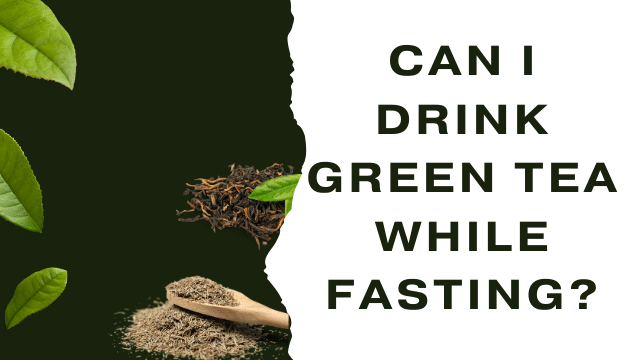Unlocking the Benefits: Green Tea and Intermittent Fasting
Embarking on the journey of intermittent fasting, whether motivated by health improvements, religious beliefs, or simply a desire to get started, prompts a common question: What should you drink during your intermittent fasts? Making a conscious decision to incorporate intermittent fasting into your diet plan is a commitment to enhance your well-being.
Optimizing your fasting experience is crucial to reaping the rewards of intermittent fasting while ensuring a comfortable, enjoyable, and effective process. This article explores the merits of choosing green tea as your beverage of choice during intermittent fasting, regardless of whether you’re following a 21-hour fast, the 16/8 method, or any other intermittent fasting approach.
Delving into the intricacies of how and why green tea does not disrupt your fast, we’ll uncover its unique qualities that align seamlessly with intermittent fasting principles. Discovering the optimal times to indulge in this ancient beverage is essential, and for detailed insights, refer to our article on the best and worst times to enjoy green tea.
Additionally, we’ll unravel the manifold benefits associated with incorporating green tea into your fasting routine. Understanding how these benefits complement the intermittent fasting process adds an extra layer of value to your journey. For those seeking alternatives to green tea, we’ll explore comparable options that maintain the integrity of your fast.
Should you require further guidance on mastering intermittent fasting, check out our article providing three essential tips for a successful fasting experience. Moreover, for those in search of simple and nutritious recipes to stay on track, explore our articles featuring four delightful salad recipes and three diabetic-friendly culinary creations suitable for parties or family gatherings.
Embark on your intermittent fasting journey with confidence, armed with the knowledge of why green tea stands out as an exceptional companion in your quest for better health.
Does Tea Break Your Fast?
Have you ever pondered, “Is it permissible to indulge in tea during fasting?” or questioned whether matcha disrupts the fasting state? The answer is a reassuring no—enjoying green tea does not break your fast.
The intrinsic nature of green tea, with its absence of calories, ensures that sipping on this natural beverage does not interfere with your fasting period. Therefore, it remains a safe and permissible choice even outside your designated eating window.
Intermittent fasting, a dietary approach involving distinct eating and fasting intervals throughout the day or week, triggers autophagy—a cellular cleansing process associated with numerous health benefits.
Embarking on intermittent fasting, particularly for newcomers, may present challenges like hunger pangs during fasting windows. However, green tea, a zero-calorie beverage, becomes an ally during these periods, aiding in appetite suppression without disrupting the fasting process.
For those with a penchant for sweetness in their tea, queries like “Does honey break a fast?” or “Can cinnamon, heavy cream, or lemon water disrupt the fasting state?” might arise. A general guideline for fasting windows is to limit calorie intake to no more than 50 calories, preventing premature termination of the fasting period.
Fortunately, tea and certain other zero-calorie beverages can prove beneficial during autophagy, assisting in appetite control as your body adapts to the fasting regimen. This makes them a healthier alternative to energy drinks or diet sodas, contributing to a seamless and successful intermittent fasting experience.
Delve into the world of intermittent fasting with confidence, armed with the knowledge that incorporating green tea into your routine not only aligns with the fasting principles but also enhances your overall well-being.
What Are The Benefits Of Green Tea While Fasting?
Green Tea Benefits during Fasting
For millennia, green tea has held a prominent place in traditional Chinese medicine. Renowned for its myriad health benefits, green tea owes its therapeutic properties to the abundant flavonoids present—plant-based phytochemicals that play a pivotal role in enhancing overall well-being. The combination of green tea, lemon, ginger, and honey forms a potent elixir, further elevating its healthful attributes.
Flavonoids, the powerhouse compounds found in green tea, contribute significantly to the improvement of cellular metabolism and signaling, fostering numerous positive effects within the body.
Evidence-based advantages associated with green tea consumption include:
- Improved Brain Function and Memory: Green tea has been linked to enhanced cognitive function and memory recall.
- Fat Burning and Enhanced Athletic Performance: The metabolism-boosting properties of green tea contribute to effective fat burning and improved athletic prowess.
- Reduced Risk for Breast Cancer: Regular green tea consumption has been correlated with a lowered risk of breast cancer.
- Lowered Risk for Alzheimer’s and Parkinson’s Disease: Green tea’s neuroprotective qualities contribute to a reduced risk of neurodegenerative diseases.
- Anti-Inflammatory Effects: Green tea’s ability to curb inflammation promotes overall health.
- Reduced Risk of Obesity and Related Disorders: Regular consumption is associated with a lower risk of obesity and its associated health issues.
- Heart Health: Green tea is linked to a decreased risk of heart disease and lower blood pressure.
- Reduced Risk of Type 2 Diabetes: Green tea aids in improved blood sugar control and lowers blood sugar levels.
- Immune System Support: The strengthening of the immune system is among the comprehensive benefits of green tea.
All these advantages seamlessly align with the goals of intermittent fasting, aiming to enhance well-being and mitigate the risk of chronic diseases.
Exploring Synergies: Green Tea for Weight Loss and Detoxification
Delving deeper into the symbiotic relationship between green tea and intermittent fasting, two specific areas emerge: green tea’s role in weight loss and athletic performance, and its prowess as a detoxifying agent.
Stay tuned as we unravel the intricate connections between green tea and the objectives of intermittent fasting, exploring how this ancient elixir can elevate your fasting experience to new heights.
Green Tea’s Impact on Weight Loss and Athletic Performance during Intermittent Fasting
Embracing intermittent fasting, a formidable time-restricted feeding approach for weight loss, becomes even more potent when accompanied by the addition of green tea to your dietary regimen.
A common query that may arise is, “Does green tea contribute to calorie intake?” The answer is a resounding no. Green tea stands as a zero-calorie elixir, renowned for its appetite-suppressing properties, effectively reducing energy intake at subsequent meals.
The significance of this lies in green tea’s ability to alleviate hunger and food cravings during fasting, thereby enhancing the overall comfort and adherence to intermittent fasting protocols.
Research illuminates the multifaceted benefits of green tea, particularly in the realm of weight loss and athletic performance. Studies indicate that the intake of green tea extract before exercise correlates with increased fat oxidation rates, heightened insulin sensitivity, and improved glucose tolerance in young men.
Moreover, another study unveils that green tea catechins, compounds abundant in tea, cocoa, and berries, exhibit a remarkable antioxidant activity. These catechins play a pivotal role in appetite suppression and elevating the overall fat oxidation process, both at rest and during physical exertion.
It’s crucial to note that green tea is not devoid of caffeine; rather, it serves as a natural source of this stimulant. The inherent caffeine content in green tea contributes to an elevated metabolic rate and a significant upsurge in the rate of fat oxidation.
The collective evidence underscores the undeniable advantages of incorporating green tea into an intermittent fasting routine. Beyond merely suppressing appetite, green tea becomes a catalyst in increasing the efficiency of fat oxidation and boosting metabolic rates. This dynamic pairing offers a holistic approach to optimizing weight loss outcomes during intermittent fasting.
Embark on your journey with confidence, embracing green tea as a valuable ally in achieving your weight loss and fitness aspirations through the powerful strategy of intermittent fasting.
Green Tea for Detoxifying Your Body
Embracing intermittent fasting unveils a remarkable process within your body known as autophagy—a vital “housekeeping” mechanism responsible for the degradation of aging cellular components. As these older elements are dismantled, the groundwork for the growth of new, rejuvenated cells is laid.
Enter green tea, a catalyst for significant benefits during the autophagic process. Packed with antioxidants, green tea emerges as a potent ally in neutralizing free radicals and mitigating oxidative stress, thereby amplifying the efficiency of autophagy.
The dual action of green tea—shielding the body from oxidative stress and aiding in the recycling of damaged cellular material—creates a powerful synergy. This tandem detoxification process serves as a formidable defense, drastically reducing the risk of both infectious and chronic diseases.
The cumulative impact on overall health positions green tea, alongside other teas, as a notable contributor to anti-aging effects. Aging brings about challenges for tissues to facilitate cell growth, regeneration, and the neutralization of oxidative stress. Green tea emerges as a proactive measure, addressing these challenges and promoting a vibrant and resilient cellular environment.
The marriage of intermittent fasting with green tea transcends being merely a good idea; it evolves into a strategic and synergistic approach. By integrating these practices, you not only harness the benefits of autophagy but also elevate the detoxification potential of your body, paving the way for enhanced well-being and longevity.
Green Tea And Fasting: What Are The Drawbacks?
While allergic reactions to green tea are relatively rare, some individuals may encounter drawbacks, such as an upset stomach and constipation. Although infrequent, there have been reported instances of liver and kidney problems associated with green tea extracts, albeit the precise reasons for these reactions remain unclear.
One of the primary concerns tied to the integration of green tea into a diet regimen revolves around the potential pitfalls of excessive daily consumption. Paradoxically, the very attributes that make green tea appealing, such as its weight loss effects and caffeine content, can become detrimental when indulged in large quantities.
Research underscores a potential disadvantage of daily green tea overconsumption, revealing interference with iron absorption and the risk of causing anemia. Natural caffeine levels in green tea contribute to its downsides, with excessive intake linked to headaches, dizziness, and nausea, as evidenced by certain studies recommending caution when exceeding eight cups per day.
The unwelcome consequences of excessive caffeine intake extend beyond mild discomfort. Individuals may experience nervousness, sleep disturbances, vomiting, diarrhea, irritability, irregular heartbeat, tremors, heartburn, dizziness, ringing in the ears, convulsions, and confusion.
As a practical guideline, it’s crucial to exercise caution if you exhibit negative reactions to caffeine, are currently pregnant or nursing, or suffer from anxiety, heart issues, or bleeding disorders. Heightened awareness of green tea consumption becomes especially relevant for individuals falling into these categories.
In navigating the potential drawbacks, mindfulness and moderation stand as key principles, ensuring that the numerous benefits associated with green tea are harnessed without compromising overall well-being.
A Guide To Teas And Fasting
In the expansive realm of teas available in today’s market, green tea stands as just one among numerous varieties, each often lauded for its rejuvenating and health-enhancing properties. To streamline our exploration, we’ll categorize these teas into two main groups: traditional teas (akin to green tea) and alternative teas.
The category of traditional teas, all originating from the leaves of the Camellia sinensis plant, comprises four distinct types:
- White Tea
- Green Tea (including matcha tea)
- Oolong Tea
- Black Tea
Diverging in their fermentation duration, these teas exhibit varying densities of antioxidants, flavonoids, and caffeine. While sharing overarching benefits with green tea, each type boasts individual strengths, creating a nuanced spectrum of effects.
On the other hand, alternative teas, such as herbal teas and fruit teas, derive from diverse plants and herbs, presenting a broader range of flavors and health attributes. Examples of alternative teas include:
- Herbal Tea
- Peppermint Tea
- Hibiscus Tea
- Chamomile Tea
- Rooibos Tea
- Ginger Tea
While these teas also deliver noteworthy health benefits, courtesy of catechins and other antioxidant compounds, they distinguish themselves from the traditional teas originating from Camellia sinensis.
For a holistic understanding of the tea landscape, we’ll delve into the unique attributes of each type, unraveling the diverse array of health advantages they offer. Whether you’re a green tea enthusiast or curious about the myriad alternatives, this guide aims to provide comprehensive insights to enhance your tea and fasting journey.
Beverages to Drink While Intermittent Fasting
Discovering Refreshing and Satiating Options for Fasting
When it comes to beverages during intermittent fasting, a range of traditional and herbal teas proves to be excellent choices. In addition, we’ve compiled a list of options that not only keep you hydrated but also contribute to a sense of fullness, refreshment, appetite suppression, delightful taste, and potential weight loss acceleration.
So, what are the top beverages to enjoy during intermittent fasting?
- Water:
- The quintessential choice for hydration, aiding in digestion and overall well-being.
- Naturally-Flavored Water:
- Enhance your water with fresh fruit or vegetable slices (without artificial sweeteners), keeping it under 50 calories.
- Carbonated Water:
- Sparkling water adds effervescence to your fasting routine without any caloric concerns.
- Herbal Teas:
- Choose from a variety of herbal teas, each offering unique flavors and potential health benefits.
- Green Tea:
- Packed with antioxidants, green tea not only supports intermittent fasting but also provides a metabolism boost.
- Green Juices:
- Crafted from leafy greens and non-starchy vegetables, these juices are nutrient-dense and contribute to your fasting goals.
- Apple Cider Vinegar:
- Known for its potential to aid digestion and weight loss, apple cider vinegar can be diluted in water for a fasting-friendly option.
By incorporating these beverages into your intermittent fasting routine, you not only support your hydration needs but also introduce elements that may enhance the fasting experience. Whether it’s the simplicity of water, the nuanced flavors of herbal teas, or the antioxidant-rich qualities of green tea, these choices align seamlessly with your fasting objectives, offering both satisfaction and potential health benefits.
Unveiling the Power of Green Tea Fasting: A Comprehensive Overview
Exploring the Synergy of Intermittent Fasting and Green Tea
As discussed earlier, intermittent fasting stands as a multifaceted approach with extensive benefits for both weight loss and overall well-being. In tandem with these advantages, green tea emerges as a key player, offering effects that make it an ideal beverage for satiating hunger during fasting windows.
We’ve also delved into the realm of other weight loss teas, recognizing herbal teas and fruit teas as noteworthy alternatives. However, it’s important to note that their effects may extend beyond the scope of our exploration in this article.
Enter Amla Green, a revolutionary blend that harnesses all the benefits of green teas and introduces the potent advantages of amla, arguably one of the most powerful medicinal plants on the planet. Remarkably, Amla Green achieves this without disrupting your fasting state.
For those seeking to delve deeper into the realm of one of the most potent natural drinks for intermittent fasting, we invite you to click below to learn more and embark on a risk-free exploration.
Amla Green offers versatility with options in both regular and decaffeinated versions, complemented by a delightful hibiscus flavor. Take the step toward optimizing your intermittent fasting experience with Amla Green—try it today!
FAQs: Unveiling Insights into Fasting and Tea Consumption
Is green tea beneficial during fasting?
Certainly! Green tea serves as an excellent companion during fasting, helping to alleviate hunger pangs and enhance overall comfort. For a serene fasting experience, opt for teas with calming properties, such as ginger and hibiscus.
Can green tea be consumed on an empty stomach?
While green tea boasts health benefits, it contains polyphenols known as tannins, which can increase stomach acid. To avoid potential discomfort, it’s advisable to consume green tea between meals or after a meal. Morning consumption on an empty stomach may pose risks to the liver due to its high catechin content.
How many cups of green tea are recommended during fasting?
To maximize health benefits, aim for 3 to 4 cups of unsweetened tea daily, whether during fasting or regular periods. For optimal preservation of tea’s heart-healthy components, consider incorporating cold-brewed tea into at least half of your daily consumption.
Which teas can be enjoyed without breaking a fast?
For a caffeine fix during fasting, green tea, black tea, or coffee without additives are recommended. While coffee provides the highest caffeine content, green tea and matcha are also excellent options for intermittent fasting.
Does green tea disrupt ketosis?
While green and black tea leaves align with a keto-friendly diet, caution is advised with ready-to-drink bottled or instant teas that may contain added sugars. Adjusting habits, such as adding milk and sugar to tea, is essential to maintain ketosis during fasting.
What doesn’t break a fast?
Fasting-compatible foods include:
- Water: Essential for hydration, plain or carbonated water contains no calories.
- Coffee and Tea: Consume without added sugar, milk, or cream.
- Diluted Apple Cider Vinegar: A permissible option during fasting.
- Healthy Fats: Incorporate sources of healthy fats to support fasting.
- Bone Broth: A nourishing choice to complement your fasting routine.
These insights aim to enhance your understanding of fasting and tea consumption, ensuring a harmonious integration for optimal well-being.


